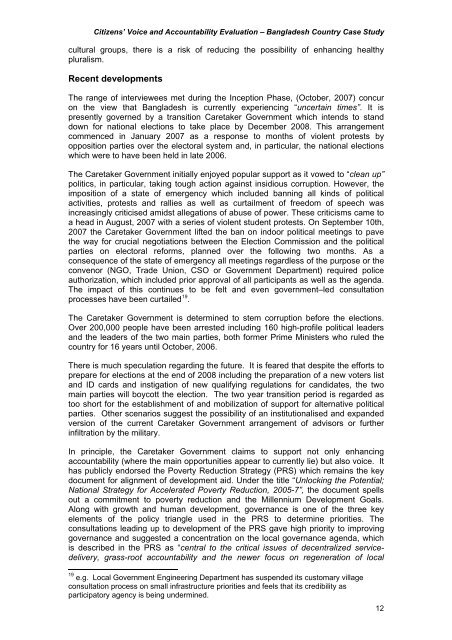Bangladesh - Belgium
Bangladesh - Belgium
Bangladesh - Belgium
You also want an ePaper? Increase the reach of your titles
YUMPU automatically turns print PDFs into web optimized ePapers that Google loves.
Citizens’ Voice and Accountability Evaluation – <strong>Bangladesh</strong> Country Case Study<br />
cultural groups, there is a risk of reducing the possibility of enhancing healthy<br />
pluralism.<br />
Recent developments<br />
The range of interviewees met during the Inception Phase, (October, 2007) concur<br />
on the view that <strong>Bangladesh</strong> is currently experiencing “uncertain times”. It is<br />
presently governed by a transition Caretaker Government which intends to stand<br />
down for national elections to take place by December 2008. This arrangement<br />
commenced in January 2007 as a response to months of violent protests by<br />
opposition parties over the electoral system and, in particular, the national elections<br />
which were to have been held in late 2006.<br />
The Caretaker Government initially enjoyed popular support as it vowed to “clean up”<br />
politics, in particular, taking tough action against insidious corruption. However, the<br />
imposition of a state of emergency which included banning all kinds of political<br />
activities, protests and rallies as well as curtailment of freedom of speech was<br />
increasingly criticised amidst allegations of abuse of power. These criticisms came to<br />
a head in August, 2007 with a series of violent student protests. On September 10th,<br />
2007 the Caretaker Government lifted the ban on indoor political meetings to pave<br />
the way for crucial negotiations between the Election Commission and the political<br />
parties on electoral reforms, planned over the following two months. As a<br />
consequence of the state of emergency all meetings regardless of the purpose or the<br />
convenor (NGO, Trade Union, CSO or Government Department) required police<br />
authorization, which included prior approval of all participants as well as the agenda.<br />
The impact of this continues to be felt and even government–led consultation<br />
processes have been curtailed 19 .<br />
The Caretaker Government is determined to stem corruption before the elections.<br />
Over 200,000 people have been arrested including 160 high-profile political leaders<br />
and the leaders of the two main parties, both former Prime Ministers who ruled the<br />
country for 16 years until October, 2006.<br />
There is much speculation regarding the future. It is feared that despite the efforts to<br />
prepare for elections at the end of 2008 including the preparation of a new voters list<br />
and ID cards and instigation of new qualifying regulations for candidates, the two<br />
main parties will boycott the election. The two year transition period is regarded as<br />
too short for the establishment of and mobilization of support for alternative political<br />
parties. Other scenarios suggest the possibility of an institutionalised and expanded<br />
version of the current Caretaker Government arrangement of advisors or further<br />
infiltration by the military.<br />
In principle, the Caretaker Government claims to support not only enhancing<br />
accountability (where the main opportunities appear to currently lie) but also voice. It<br />
has publicly endorsed the Poverty Reduction Strategy (PRS) which remains the key<br />
document for alignment of development aid. Under the title “Unlocking the Potential;<br />
National Strategy for Accelerated Poverty Reduction, 2005-7”, the document spells<br />
out a commitment to poverty reduction and the Millennium Development Goals.<br />
Along with growth and human development, governance is one of the three key<br />
elements of the policy triangle used in the PRS to determine priorities. The<br />
consultations leading up to development of the PRS gave high priority to improving<br />
governance and suggested a concentration on the local governance agenda, which<br />
is described in the PRS as “central to the critical issues of decentralized servicedelivery,<br />
grass-root accountability and the newer focus on regeneration of local<br />
19 e.g. Local Government Engineering Department has suspended its customary village<br />
consultation process on small infrastructure priorities and feels that its credibility as<br />
participatory agency is being undermined.<br />
12

















